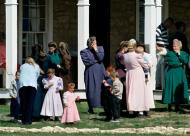Why is Confirmation Sometimes Held on Palm Sunday?

In the comments section of my last post I mentioned that the rite of Confirmation is held in some churches on Palm Sunday. The only reason I could see for the choice was allowing the newly confirmed to commune on Maundy Thursday and Easter. While that may be the reason adopted by some, Dr. David Scaer in a conference paper entitled "Confirmation as a Sacramental Rite" (2002, In Christ: The Collected Works of David P. Scaer, Vol. II ), offers another explanation you may find interesting. He relates his experience at a German cultural museum in Berlin which featured an exhibit on Confirmation in its nineteenth-century section: "In what then had become a united Germany under the leadership of Chancellor Bismark, Confirmation was the rite of passage from youth to adulthood. A Confirmation certificate served also as a diploma testifying to the good moral character of the confirmed, recommending her or him to their first employers. It seems as if this view of the rite c...




